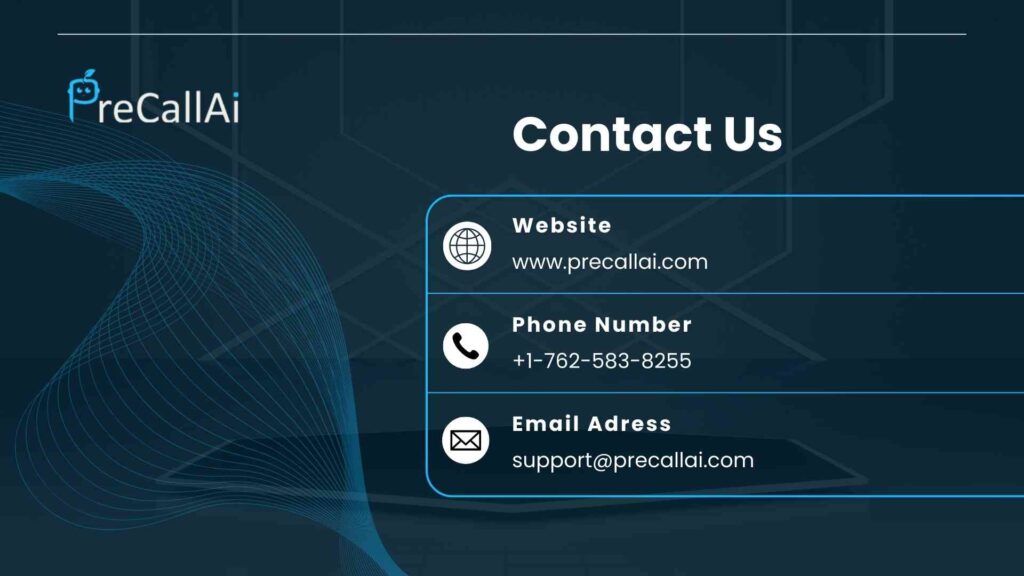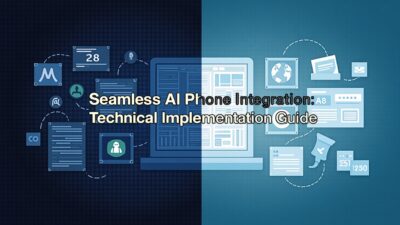An AI phone call analytics dashboard serves as the central nervous system of modern call operations. It provide real-time visibility into performance metrics, conversation quality, and optimization opportunities.
Table of Contents
The traditional approach to call analysis relied heavily on manual call monitoring, subjective evaluations, and limited sampling. Modern AI phone call analytics dashboard solutions leverage advanced machine learning algorithms, natural language processing, and predictive analytics.
This comprehensive guide explores the essential metrics, features, and strategies that define effective call analytics in the AI era. Understanding what to track—and why—is crucial. Every organization wants to get the most value from phone-based customer interactions. A smart AI call analytics dashboard can help. It provides key insights. These insights transform how you view and improve customer communication.
The Evolution of Call Analytics: From Manual to AI-Powered Intelligence
Customer communication has changed. Traditional call monitoring is no longer enough. Now, AI-powered analytics lead the way. This shift is a major step forward in managing customer interactions. Early call analysis systems relied on manual call listening, basic call recording, and simple metrics like call duration and volume. These approaches provided limited insights and required substantial human resources to generate even basic performance reports.
Automated call distribution and basic analytics tools improved data collection. But they focused mostly on numbers. These systems relied on quantitative metrics. They missed the deeper, qualitative side of customer interactions. Traditional tools could count calls and measure duration. But they couldn’t understand what was said. They couldn’t detect emotion or how well relationships were built.
Modern AI call analytics dashboards have changed the game. They analyze both numbers and conversation quality. These systems study speech patterns and detect emotional cues. They can extract key topics and themes. Some even predict call outcomes based on how the conversation flows. This leads to powerful insights. Businesses can now optimize sales, improve customer service, and boost communication effectiveness—all with data-driven decisions.
Essential Metrics Every AI Phone Call Analytics Dashboard Should Track
Conversation Intelligence and Content Analysis
Effective call analytics starts with strong conversation intelligence. It goes beyond basic metrics. It focuses on the actual content and context of each interaction. A good AI call analytics dashboard should track talk-time ratios. It shows how much time sales reps talk versus listen. This balance often links directly to call success rates.
Keyword and phrase tracking capabilities enable organizations to identify which topics, products, or concerns arise most frequently in customer conversations. This intelligence helps sales teams understand customer priorities, identify common objections, and develop more effective messaging strategies. AI systems can track competitor mentions. They also monitor pricing discussions and feature requests. This data offers valuable insights. It supports product development and strengthens competitive positioning.
Question analysis represents another crucial component of conversation intelligence. AI call analytics dashboards can track discovery questions. They detect when sales reps ask them. They also analyze how customers respond. The system compares different questioning styles. It shows which types lead to successful outcomes. This insight enables organizations to develop better sales methodologies and improve representative training programs.
Sentiment Analysis and Emotional Intelligence Tracking
Understanding the emotional dynamics of customer conversations provides critical insights that traditional metrics cannot capture. Advanced AI call analytics dashboards use sentiment analysis. They track emotional tone during the conversation. The system detects moments of enthusiasm, concern, frustration, or satisfaction. This helps teams understand customer emotions in real time.
Real-time sentiment tracking shows when conversations turn positive or negative. This allows teams to act immediately. Managers can step in when needed. Sales managers get alerts if a call’s tone starts to drop. They can then offer live support or plan a follow-up. This helps save valuable opportunities.
AI can predict customer satisfaction using sentiment analysis. This gives organizations powerful forecasting tools. It helps spot service issues early. It also reveals upselling opportunities. Teams can better plan follow-up actions. By analyzing patterns across many calls, AI finds hidden signs. These signs help predict customer behavior and satisfaction levels.
Performance Optimization and Coaching Metrics
An effective AI phone call analytics dashboard must provide comprehensive performance tracking that enables both individual coaching and team optimization. Call outcome analysis tracks conversion rates, appointment setting success, and revenue generation across different representatives, time periods, and customer segments.
Objection handling is a key performance metric. AI systems can track it closely. They identify common objections. They analyze how well each representative addresses concerns. This helps improve overall effectiveness. This intelligence enables organizations to develop better objection handling strategies and provide targeted coaching to improve conversion rates.
Compliance monitoring has become increasingly important as regulatory requirements become more complex. AI call analytics dashboards track disclosure delivery automatically. They confirm consent on every call. They monitor regulatory compliance throughout. This creates auditable documentation. The system also spots potential compliance risks early. This helps prevent violations before they happen.
Advanced Features of Modern AI Phone Call Analytics Dashboard Systems
Real-Time Analytics and Live Coaching Capabilities
The most sophisticated AI phone call analytics dashboard solutions provide real-time analysis and coaching capabilities that enable immediate performance optimization. Live conversation monitoring lets managers watch calls in real time. They track call progress and sentiment trends. They also monitor key performance indicators. This enables immediate coaching and intervention when needed.
Automated coaching prompts can help sales reps during calls. They suggest responses to objections. Recommend questions to ask. Alert reps about important topics to cover. This real-time coaching improves performance on the spot. It leads to better outcomes and faster skill development.
Predictive call scoring analyzes conversations as they happen. It predicts likely call outcomes. This helps managers prioritize calls needing immediate support. It also highlights the highest value opportunities.
Integration and Workflow Automation
Modern AI call analytics dashboards must integrate smoothly with existing sales and service tools. This provides full visibility and automates workflows. Integration with customer relationship management (CRM) systems is essential. It syncs call insights automatically with customer records. This creates complete interaction histories. It also enables more effective follow-up actions.
Automated task creation uses call analysis to guide follow-ups. This ensures the right actions happen after each call. For example, calls with customer concerns can create support tickets automatically. Calls that reveal expansion opportunities generate sales tasks. These tasks are assigned to account managers.
Lead scoring automation updates prospect scores using call analysis. It does this in real time. This helps sales teams prioritize their efforts. They focus on prospects showing the highest interest and buying intent.
Industry-Specific Applications and Use Cases
Sales Team Performance Optimization
Sales organizations represent the primary beneficiaries of sophisticated AI phone call analytics dashboard capabilities. These systems enable sales managers to identify top performers’ success patterns and replicate those strategies across their teams. By analyzing successful sales calls, organizations can identify optimal talk tracks, effective questioning strategies, and successful objection handling approaches.
Territory and market analysis capabilities help sales organizations understand performance variations across different geographic regions, customer segments, and product lines. This intelligence enables more effective resource allocation and territory planning based on actual performance data rather than assumptions or historical patterns.
Pipeline management becomes more accurate when AI phone call analytics dashboard systems provide insights into deal progression, customer engagement levels, and likelihood of closing based on conversation analysis. Sales managers can make more informed forecasting decisions and provide targeted coaching to improve deal velocity and win rates.
Customer Service Excellence and Support Optimization
Customer service organizations leverage AI phone call analytics dashboard systems to monitor service quality, identify training opportunities, and optimize support processes. First call resolution tracking helps organizations understand which types of issues are resolved effectively and which require multiple interactions, enabling process improvements and better resource allocation.
Customer effort scoring based on conversation analysis provides insights into how difficult customers find it to resolve their issues, enabling organizations to identify and eliminate friction points in their support processes. This intelligence is crucial for improving customer satisfaction and reducing support costs.
Agent performance analysis helps customer service managers identify coaching opportunities, recognize top performers, and ensure consistent service quality across their teams. The AI systems can identify agents who excel at de-escalation, problem-solving, or customer relationship building, enabling knowledge sharing and best practice development.
Healthcare and Professional Services Applications
Healthcare organizations and professional services firms use AI phone call analytics dashboard systems to ensure compliance with industry regulations, monitor patient satisfaction, and optimize appointment scheduling processes. Patient communication analysis helps healthcare providers understand common concerns, identify service gaps, and improve patient experience.
Professional services firms leverage call analytics to track client satisfaction, identify expansion opportunities, and ensure consistent service delivery across their teams. The ability to analyze client communication patterns helps these organizations build stronger relationships and identify potential issues before they impact client retention.
Data Security and Privacy Considerations for AI Phone Call Analytics Dashboard
Compliance and Regulatory Requirements
Organizations implementing AI phone call analytics dashboard systems must carefully address data privacy and security requirements, particularly given the sensitive nature of recorded customer conversations. GDPR compliance requires explicit consent for call recording and analysis in European markets, while CCPA and other privacy regulations impose similar requirements in various jurisdictions.
HIPAA compliance becomes critical for healthcare organizations using call analytics, requiring specialized security measures and access controls to protect patient health information. Financial services organizations must comply with industry-specific regulations that govern the handling and analysis of financial data captured during customer calls.
Call recording retention policies must be carefully designed to balance analytical value with privacy requirements and storage costs. Organizations must establish clear guidelines for how long call recordings and analysis data are retained, who has access to this information, and under what circumstances it can be shared or disclosed.
Technical Security and Access Controls
Advanced encryption protocols protect call recordings and analytical data both in transit and at rest, ensuring that sensitive customer information remains secure throughout the analysis process. Multi-factor authentication and role-based access controls ensure that only authorized personnel can access call analytics data and insights.
Audit logging capabilities track all access to call analytics data, providing comprehensive records of who accessed what information and when. These audit trails are essential for compliance reporting and investigation of potential security incidents.
Data anonymization and pseudonymization techniques can be employed to protect customer privacy while still enabling meaningful analysis of call patterns and performance metrics. These approaches allow organizations to gain insights while minimizing privacy risks and regulatory exposure.
Measuring ROI and Success Metrics for AI Phone Call Analytics Dashboard Implementation
Quantitative Performance Indicators
Organizations must establish clear metrics for measuring the return on investment and effectiveness of their AI phone call analytics dashboard implementation. Revenue impact metrics include improvements in conversion rates, average deal size, and sales cycle length that can be directly attributed to insights gained from call analytics.
Cost reduction measurements track savings achieved through improved efficiency, reduced training costs, and better resource allocation enabled by call analytics insights. Customer service organizations often see significant cost savings through improved first call resolution rates and reduced average handle times.
Productivity improvements can be measured through metrics such as calls per day, successful outcomes per representative, and time spent on high-value activities versus administrative tasks. These efficiency gains often represent substantial value creation for organizations implementing comprehensive call analytics programs.
Qualitative Impact Assessment
Customer satisfaction improvements resulting from better call quality and more effective issue resolution represent important qualitative benefits of AI phone call analytics dashboard implementation. Regular customer feedback surveys can help organizations quantify these improvements and demonstrate the value of their analytics investments.
Employee satisfaction and engagement often improve when representatives receive better coaching and support based on call analytics insights. Reduced turnover rates and improved job satisfaction scores indicate successful implementation of analytics-driven performance management programs.
Competitive advantages gained through better understanding of customer needs, market trends, and sales effectiveness can be difficult to quantify but represent significant long-term value for organizations that effectively leverage call analytics insights.
Future Trends and Emerging Capabilities in AI Phone Call Analytics Dashboard
Advanced AI and Machine Learning Integration
The future of call analytics lies in increasingly sophisticated artificial intelligence capabilities that provide deeper insights and more predictive value. Advanced natural language processing will enable more nuanced understanding of customer communication, including detection of subtle emotional cues and complex intent analysis.
Predictive analytics capabilities will become more sophisticated, enabling organizations to forecast customer behavior, identify churn risks, and predict sales outcomes with greater accuracy. These predictive insights will enable more proactive customer management and strategic decision-making.
Integration with other AI systems, such as chatbots and automated customer service platforms, will create comprehensive customer communication intelligence that spans all interaction channels and touchpoints.
Real-Time Decision Support And Automation For AI phone Call Analytics Dashboard
Future AI phone call analytics dashboard systems will provide increasingly sophisticated real-time decision support, enabling automated responses to specific conversation scenarios and immediate optimization of customer interactions. This automation will help organizations respond more quickly to customer needs and optimize outcomes without requiring manual intervention.
Automated coaching and training recommendations based on call analysis will become more personalized and effective, providing targeted skill development opportunities that address specific performance gaps identified through conversation analysis.
Integration with emerging technologies such as augmented reality and virtual reality training platforms will create immersive coaching experiences that help representatives practice and improve their communication skills based on insights from call analytics.
Building a Comprehensive Call Analytics Strategy For AI phone Call Analytics Dashboard
Implementation Planning and Change Management For AI phone Call Analytics Dashboard
Successful deployment of an AI phone call analytics dashboard requires careful planning and comprehensive change management to ensure adoption and effectiveness. Organizations must establish clear objectives for their call analytics program, identifying specific business outcomes they hope to achieve and metrics they will use to measure success.
Training and onboarding programs must be developed to help employees understand how to use call analytics insights effectively and how the system will impact their daily work routines. Resistance to monitoring and analysis can be addressed through transparent communication about the benefits of call analytics for both individual performance improvement and organizational success.
Phased implementation approaches often work best, allowing organizations to gradually expand their use of call analytics capabilities while learning and adapting their processes based on early results and feedback.
Continuous Improvement and Optimization For AI phone Call Analytics Dashboard
AI phone call analytics dashboard systems require ongoing attention and optimization to maintain effectiveness and adapt to changing business needs. Regular review of analytics insights and performance metrics helps organizations identify new opportunities for improvement and optimization.
Feedback loops between call analytics insights and sales training, customer service processes, and product development ensure that organizations can act on the intelligence they gather to drive continuous improvement across all aspects of their customer communication.
Technology updates and capability enhancements should be regularly evaluated and implemented to ensure that organizations are leveraging the most advanced analytics capabilities available and staying ahead of competitive threats.
Also Read: SaaS AI Onboarding Calls: From Trial To Paid In 7 Days
Conclusion

The implementation of a comprehensive AI phone call analytics dashboard represents a fundamental transformation in how organizations understand, manage, and optimize their customer communications. By providing unprecedented visibility into conversation dynamics, performance patterns, and optimization opportunities, these systems enable data-driven decision-making that drives revenue growth, improves customer satisfaction, and creates sustainable competitive advantages.
The key to success lies in understanding that call analytics is not just about collecting data, but about transforming that data into actionable insights that drive meaningful business improvements. Organizations that effectively leverage AI phone call analytics dashboard capabilities will be better positioned to build stronger customer relationships, optimize their sales and service processes, and adapt quickly to changing market conditions.
As artificial intelligence capabilities continue to advance and customer expectations continue to evolve, the organizations that invest in comprehensive call analytics programs today will be best positioned to thrive in an increasingly competitive marketplace. The insights provided by sophisticated AI phone call analytics dashboard systems will become increasingly critical for maintaining customer satisfaction, optimizing operational efficiency, and driving sustainable business growth.
For organizations ready to transform their approach to customer communication, implementing a robust AI phone call analytics dashboard is not just about improving current performance; it’s about building the foundation for long-term success in an increasingly data-driven business environment where customer communication excellence becomes the ultimate competitive differentiator.






[…] Read More: The Ultimate AI Phone Calls Analytics Dashboard Guide […]
[…] AI phone assistant vs human receptionist availability differs significantly. AI systems operate 24/7 without interruption. They handle peak call volumes without degradation. System updates happen during low-traffic periods. […]
[…] Voice analytics AI examines spoken conversations automatically. The system processes audio data to extract meaningful information. Customer service calls become rich sources of business intelligence. […]